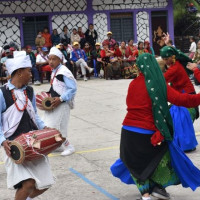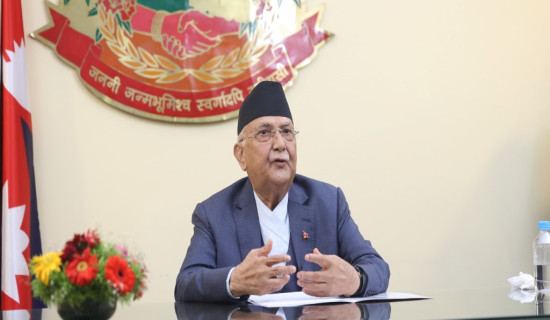- Tuesday, 3 June 2025
Ordeals Of A Bhutanese Refugee
Om Prakash Dhungel, a refugee from Bhutan, has attempted a wonderful account of the sharply fluctuating ups and downs of his life as a result of the consciously and systematically planned and racially inspired ethnic cleansing policy of the Druk Kingdom of Bhutan.
Dhungel is a telecommunications professional who was among the victims of over a hundred thousand people uprooted from their homes in utter dispossession, and in the midst of the orgy of loot, violence, killing and rape unleashed by the Druk government perpetrating the worst violations of human rights, civil liberty and democracy. Dhungel has been ably assisted by an award-winning journalist, James Button, to bring the touching story of the ostracised people to the public.
The book entitled BHUTAN TO BLACKTOWN: Losing Everything and Finding Australia, initially intended to serve as a practitioner's manual for settlement in Australia, is divided into 12 convenient chapters. Blacktown is a fast-growing township in Sydney and is taken as one of the most important multicultural locations with a population surpassing four hundred thousand people from various parts of the world.
Prior to the description in terms of chapters, Dhungel has some sort of prologue in the form of a separate chapter, An Australian by Accident. He gives a touching saga of his own life, starting from a good bureaucratic position for almost one year in the service of the Bhutanese royal regime before being victimised by the racist government, forcing him to flee the country and ultimately land in Australia for safety. It is an irony that the country that boasts of being a peaceful Buddhist kingdom with the highest emphasis on calling it a country with gross national happiness has earned international notoriety for its sinister policy of ethnic cleansing.
The major highlight of this very interesting and even moving work is the foreword by Hon. Anthony Albanese, Prime Minister of Australia. Albanese commends the personality of Dhungel and calls his saga an extraordinary story of confrontation with adversity to make a difference. The Australian leader strikes a wonderful coincidence in the writer's circumstances that forced him to leave his own country under extreme duress and the very fact that he chose Down Under as his new home, making a positive impact.
The book has an attractive cover and a topographical map of Bhutan with all countries in its neighbourhood, Nepal, India and Bangladesh, showing the border with China and Myanmar. The first two chapters deal with both school and college education that Dhungel was able to undertake thanks to the policy of modernisation adopted by the third and fourth kings of the Druk dynasty, Jigme Dorji Wangchuk and Jigme Singye Wangchuk, respectively, little realising then that the same regime under the fourth king would soon launch a systematic drive to expel the major community of Nepali origin who toiled hard to make Bhutan habitable and prosperous.
While Dhungel excelled in his school education in a good boarding school, he graduated in engineering from Bangladesh's elite institution, Bangladesh University of Engineering Technology, more popularly known by its famous acronym, BUET. Founded by the government of Bengal as a Dhaka Survey School in 1876, the institution passed through several academic innovations to ultimately emerge as the East Pakistan University of Engineering and Technology (EPUET) in 1962. After Bangladesh got independence, its nomenclature changed to BUET.
Chapter three covers beautiful things about Bhutan and its capital city, Thimphu, and the status of telecommunications facilities, as the writer was gainfully employed and had good contacts as well as exposures at home and abroad. It also portrays the fourth king's marriage with four sisters after having them betrothed nine years earlier and already having eight children from them.
It also gives a passing reference to the influence of events, albeit indirect, on the rulers of Bhutan to undertake such grossly inhuman steps by trends in neighbouring Sikkim, where the monarchy was overthrown and the state opted, under different circumstances, both transparent and opaque, to join India; the rise of the Gorkhaland movement in some parts of West Bengal in India; and the movement for the restoration of multiparty democracy in Nepal.
The chapter ends with a suspicious move undertaken by the Bhutan government with an ulterior motive to conduct a census on its southern region with obvious intentions to drive out a large chunk of the hard-working and totally loyal Nepali-speaking Bhutanese population.
Chapter four gives a vividly tortuous account of the worst type of state-sponsored violence against its own citizens in the name of ethnic cleansing, and it is followed by the fifth chapter that seeks to portray the most dreadful status of Bhutanese refugees now finding their place in Nepal with direct Indian connivance.
It also laments the virtual silence of the world community despite some lip sympathies on the part of some people and organisations.
Subsequent chapters from six to eleven basically relate to the arrival of refugees in Australia and arrangements to settle some thousand refugees in the Blacktown area of Sydney and the saga of struggles made by the people to get jobs and settle in their new homes.
The twelfth and last chapter is basically a nostalgia of the place where Dhungel was born and spent a good time there before being uprooted from the country as people were forced to flee for survival in a status of dispossession, fear, hatred, ill-treatment and violence.
It highlights the fact that while a large number of people of Nepali origin called Lhotshampas, meaning southerners, constituted one-third of the total population of the country before the orgy of ethnic cleansing, they still comprise about a fifth of the 8,00,000 population of the country and stay there under subjugation, fear and suspicion.
The most readable work ends with a four-page gratitude to people from a wider canvas, including co-author Button, who helped and assisted Dhungel to bring out the most laudable book. It's anybody's guess that such books must be on the anvil from other parts of the world too, as academically enlightened Bhutanese refugees have been dispersed worldwide to escape the worst form of human rights violations of the Druk regime that survives on an artificial plank of Buddhism, peace and gross national happiness.
(Dr Bhattarai is a former foreign secretary, ambassador and author kutniti@gmail.com.)



-original-thumb.jpg)













